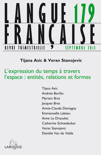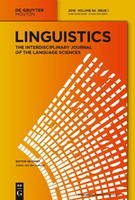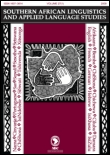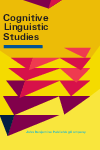
Russian Journal of Linguistics
metrics 2024
Elevating Linguistic Scholarship to New Heights
Introduction
Welcome to the Russian Journal of Linguistics, a prestigious journal published by Peoples Friendship University of Russia that has made significant strides in the realm of linguistic studies since its inception. With an Open Access policy established in 2019, this journal provides unparalleled opportunities for researchers, professionals, and students to share and disseminate groundbreaking linguistic research. The journal is currently ranked in the Q1 category for Linguistics and Language and boasts impressive Scopus rankings, placing 129th out of 1088 in the Arts and Humanities, and 148th out of 1167 in the Social Sciences. Focusing on a diverse range of linguistics topics, the journal aims to facilitate cross-disciplinary dialogue and foster advancements in the study of language. Located in Moscow, Russia, it champions the vibrant linguistic community by consistently publishing high-quality research that contributes to the global understanding of language dynamics. We invite you to explore the wealth of knowledge and insight the Russian Journal of Linguistics has to offer.
Metrics 2024
 0.59
0.59 1.50
1.50 1.40
1.40 14
14Metrics History
Rank 2024
Scopus
JCI (Web Of Science)
Quartile History
Similar Journals

LANGUE FRANCAISE
Advancing the Frontiers of French LinguisticsLANGUE FRANCAISE, published by LAROUSSE, stands as a premier journal in the realm of linguistics and language studies, boasting an impressive Q1 quartile rating in the 2023 Linguistics and Language category. With its international reputation anchored in France, this journal presents critical research and discussions that advance our understanding of the French language, its structures, usage, and evolution. Although not an open-access publication, LANGUE FRANCAISE is indexed with an ISSN of 0023-8368 and an E-ISSN of 1957-7982, reflecting its scholarly credibility and impact, including Scopus rankings that place it competitively in the fields of arts and humanities as well as social sciences. This journal serves as an essential resource for researchers, practitioners, and students aiming to deepen their knowledge and engage in scholarly debates that shape contemporary linguistic thought. The journal's commitment to high-quality research continues to foster an enriching academic environment and contribute to the dynamic discourse surrounding language and linguistics.

Rasprave
Innovating research for a deeper understanding of linguistics.Rasprave is a distinguished open access journal published by the Institute of Croatian Language and Linguistics in Croatia, dedicated to advancing the field of linguistics and language studies. With an ISSN of 1331-6745 and E-ISSN 1849-0379, the journal has embraced open access since 2007, making its research widely available to scholars globally. It holds an important position in the academic community, particularly noted for its 2023 Scopus ranking within the Arts and Humanities and Social Sciences categories, falling into the 59th and 56th percentiles respectively. The journal’s impact is further reflected in its Q3 quartile ranking in linguistic and language studies, showcasing its relevance and growing influence in this vibrant field. Rasprave aims to publish innovative research that deepens understanding of language dynamics, linguistic theory, and sociolinguistics, making it an essential resource for researchers, professionals, and students seeking to enrich their knowledge and contribute to the academic discourse surrounding language.

Suvremena Lingvistika
Transforming Linguistic Knowledge into Accessible Insights.Suvremena Lingvistika is a distinguished open-access journal published by the Croatian Philological Society, dedicated to advancing research in the field of linguistics and language. Since its establishment, the journal has been pivotal in promoting scholarly dialogue within the linguistics community, especially among researchers and academics in Croatia and beyond. With an ISSN of 0586-0296 and an E-ISSN of 1847-117X, the journal has transitioned to an open-access model since 2007, ensuring that research is freely accessible to all. As of 2023, it holds a respectable Q3 ranking in the Linguistics and Language category, reflecting its potential contribution to the field. The journal's scope encompasses a wide array of linguistic disciplines, encouraging both theoretical and empirical studies. Supportive of new research, Suvremena Lingvistika aims to foster innovative approaches and methodologies in linguistics, making it an essential resource for students, researchers, and professionals eager to explore the complexities of language. With its ongoing publication until 2024, it continues to shape the linguistic landscape, providing valuable insights and fostering collaboration among scholars globally.

RUSSIAN LINGUISTICS
Illuminating the intersections of language and psychology.RUSSIAN LINGUISTICS is a peer-reviewed academic journal published by Springer, dedicated to advancing the understanding of the Russian language and its interplay with various linguistic frameworks. With a longstanding history that spans from its inception in 1974, the journal encompasses a broad range of topics within the fields of linguistics and language studies, offering valuable insights especially in *Developmental and Educational Psychology* and the intricacies of linguistics at large. Currently ranked in the Q2 quartile for Linguistics and Language, and holding substantial positions within Scopus rankings, RUSSIAN LINGUISTICS serves as an essential resource for researchers, educators, and students alike, fostering dialogue and collaboration within the international linguistic community. The journal notably provides critical access to research findings that enhance the comprehension of Russian linguistics' role in a global context, despite operating under a traditional access model. For those pursuing scholarly excellence, RUSSIAN LINGUISTICS remains a pivotal platform for disseminating innovative research and promoting the study of language.

SKASE Journal of Theoretical Linguistics
Pioneering New Perspectives in Theoretical LinguisticsSKASE Journal of Theoretical Linguistics, published by the SLOVAK ASSOCIATION STUDY ENGLISH-SKASE, is a distinguished Open Access journal that expands the horizons of linguistic research and theoretical frameworks. With its ISSN N/A and E-ISSN 1336-782X, the journal has established itself as a pivotal resource for scholars in the field, achieving a commendable Q2 ranking in Linguistics and Language as of 2023. The journal, which has been in continuous publication since 2017, actively publishes innovative research studies, reviews, and theoretical discussions, easing access to groundbreaking work for academics and practitioners alike. Based in Slovakia, it connects a rich heritage of linguistic scholarship and is indexed in Scopus, ranking alongside its peers in both Arts and Humanities and Social Sciences categories. The SKASE Journal of Theoretical Linguistics is crucial for anyone interested in the evolving landscapes of linguistics, serving as an invaluable platform for disseminating knowledge and fostering collaboration amongst researchers worldwide.

LINGUISTICS
Exploring the Depths of Language and CommunicationLINGUISTICS, published by De Gruyter Mouton, stands as a leading journal in the field of linguistics, exemplifying innovation and scholarly rigor. With its roots tracing back to 1963 and a commitment to advancing linguistic research, this journal has consistently achieved Q1 status in both the Linguistics and Language category, marking it among the top-tier journals in the discipline. The journal is indexed with impressive rankings in Scopus, evidenced by its position within the 84th percentile in Language and Linguistics, and 83rd percentile in Social Sciences, demonstrating its significant influence and reach among scholars. Transitioning to Open Access since 2022, LINGUISTICS enhances accessibility and fosters a wider dissemination of knowledge. Published in Germany and backed by a reputable publisher, LINGUISTICS is dedicated to exploring diverse topics in linguistics, making it essential reading for researchers, professionals, and students aiming to stay at the forefront of linguistic scholarship.

Journal of Slavic Linguistics
Connecting Scholars through Slavic Linguistic ResearchJournal of Slavic Linguistics, published by SLAVICA PUBLISHERS, is a key academic resource dedicated to the exploration of Slavic languages and linguistics. Established to provide a comprehensive platform for scholarly research, this journal addresses the intricate dynamics of Slavic phonetics, syntax, semantics, and discourse, making significant contributions to both theoretical and applied linguistics. The journal holds an impact factor that reflects its value in the linguistic community, particularly as it is ranked in the Q4 category in Linguistics and Language for 2023. With a focus on a wide range of topics within the field, the Journal of Slavic Linguistics serves as an essential reference for researchers, educators, and students alike, fostering an appreciation and deeper understanding of Slavic linguistic phenomena. Although currently not an Open Access journal, it remains accessible to a broad audience keen on engaging with contemporary linguistic scholarship.

Southern African Linguistics and Applied Language Studies
Navigating Language Dynamics in a Diverse RegionSouthern African Linguistics and Applied Language Studies is a prestigious journal dedicated to the exploration and analysis of linguistics and applied language studies within the Southern African context. Published by Taylor & Francis Ltd, this esteemed journal has established itself as a significant platform for scholars and practitioners since its inception in 2003. With an impressive Q2 ranking in the Linguistics and Language category and a current Scopus rank of #430 out of 1167, it occupies a vital position in the academic landscape, appealing to a diverse readership keen on linguistic research, language policy, and applied linguistics. While the journal is not currently open access, it provides comprehensive insights and scholarly articles that foster understanding and innovation in linguistic practices and language education. As of 2024, the journal continues to deepen its impact through rigorous peer-review and a commitment to advancing knowledge, making it a key resource for researchers, educators, and students seeking to navigate the complexities of language within the Southern African region and beyond.

Lege Artis-Language Yesterday Today Tomorrow
Unveiling the Dynamics of Linguistic ChangeLege Artis: Language Yesterday Today Tomorrow is a pivotal open access journal dedicated to the dynamic and multifaceted study of language, linguistics, and communication in contemporary society. Published by the esteemed University of SS Cyril & Methodius in Trnava, Slovakia, this journal serves as a vital platform for scholars and practitioners to explore the evolution of language and its impact on culture and society. With an ISSN of 2453-8035, Lege Artis has embraced open access since 2016, ensuring that its valuable research findings are freely available to all, thus promoting wider dissemination and engagement within the academic community. The journal invites contributions that enrich the understanding of linguistic theory, historical linguistics, sociolinguistics, and applied linguistics, making it an essential resource for researchers, educators, and students alike. By fostering an interdisciplinary approach, Lege Artis aims to contribute significantly to our understanding of language as a living entity, continuously evolving and adapting to societal changes.

Cognitive Linguistic Studies
Bridging Minds: Where Language Meets CognitionCognitive Linguistic Studies is a prestigious journal published by JOHN BENJAMINS PUBLISHING CO, dedicated to advancing the interdisciplinary field of cognitive linguistics. With an ISSN of 2213-8722 and an E-ISSN of 2213-8730, the journal serves as an essential platform for the dissemination of high-quality research that delves into the intricate relationships between language, thought, and cultural contexts. Located in the vibrant academic milieu of the Netherlands, this journal has gained recognition for its impactful contributions, reflected in its respectable Q2 category ranking within the field of Linguistics and Language as of 2023. Redesigned to accommodate a broader audience, the journal welcomes original research articles, reviews, and theoretical discussions that bridge cognitive science and linguistic inquiry. As the journal continues its trajectory of growth, being indexed with a solid Scopus rank of #459 out of 1167 in the social sciences, it remains a vital resource for researchers, professionals, and students eager to explore the dynamic interplay between cognition and language.